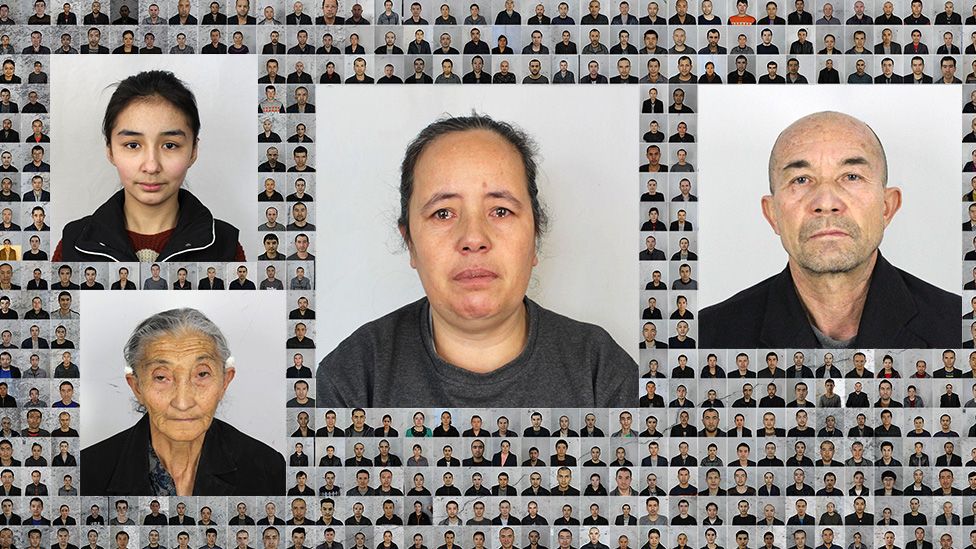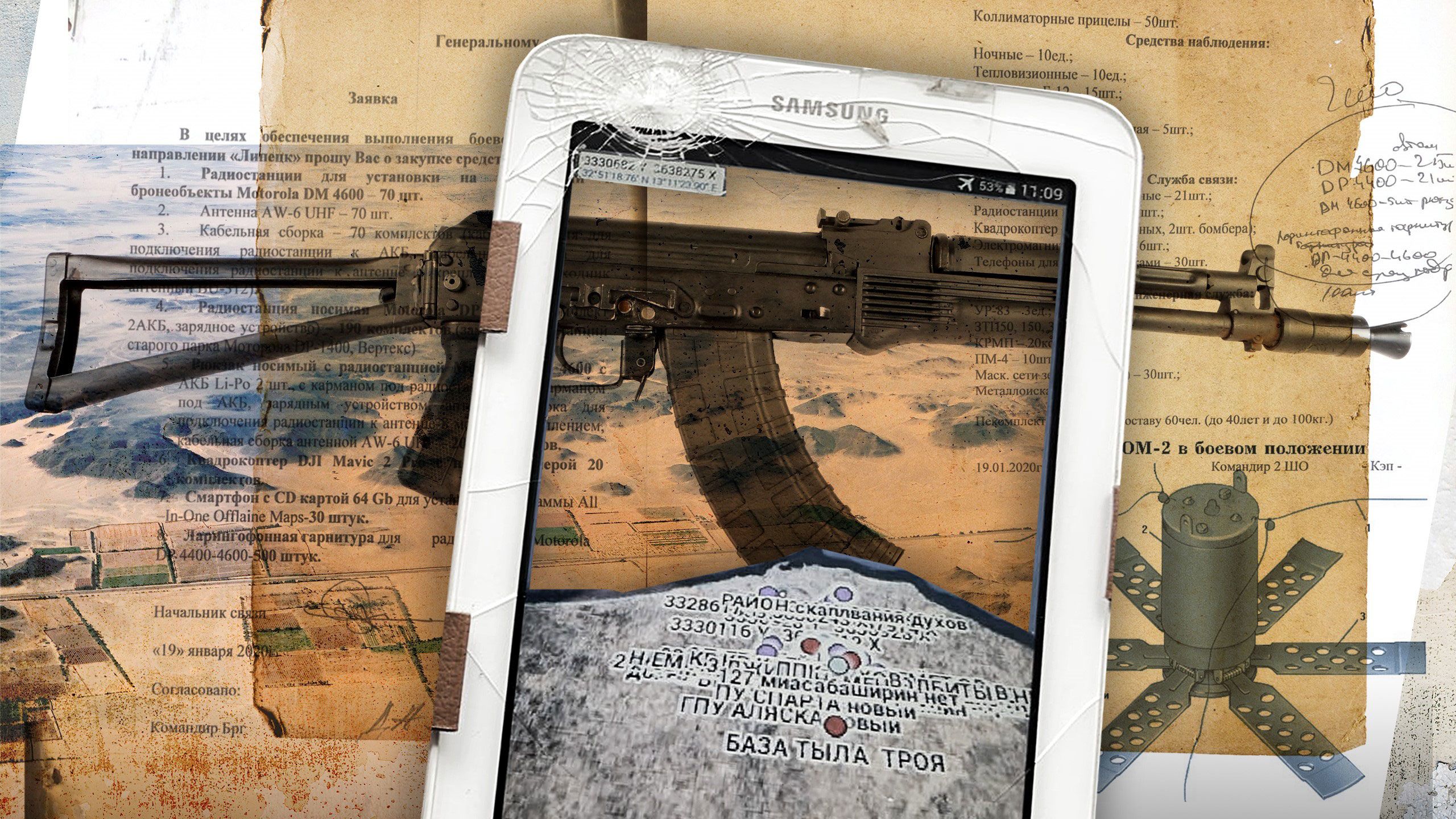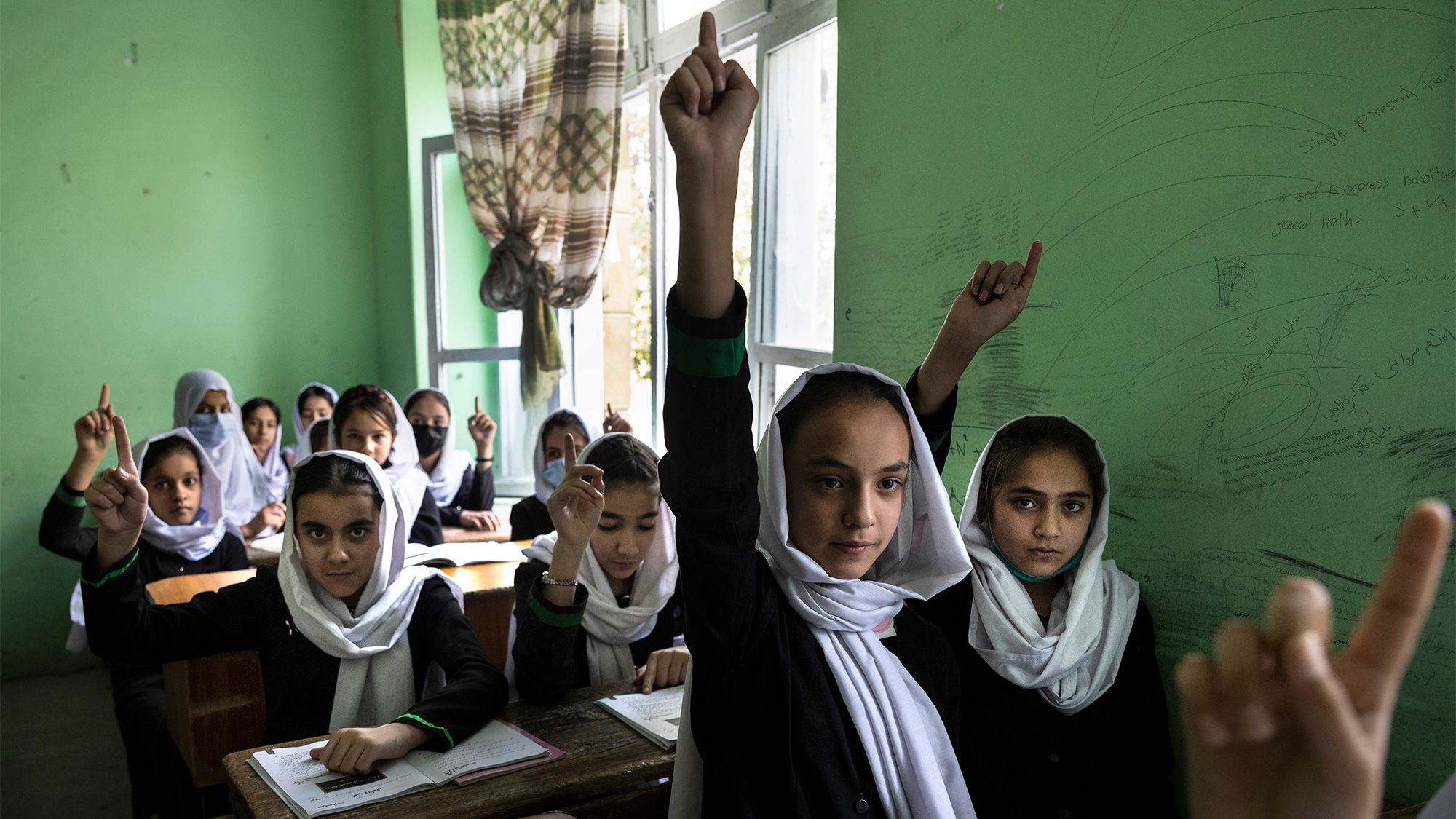Moments of reflection from a year of war


BBC correspondents covering the conflict in Ukraine recall the people and the moments that have stayed with them.
As Russia launched its full-scale invasion on the night of 24 February 2022, life for Ukrainians went underground - to basements, bunkers, bomb shelters, metro stations.
BBC teams set up a makeshift, round-the-clock operation in a car park beneath the streets of Kyiv. Lyse Doucet was among them.
Did we have enough food and water to last, perhaps, for weeks? Were we ready to remain in a city where Russian troops could, possibly, be on the streets?
We lived and worked, mattress-to-mattress, with Ukrainians who asked the same questions. Our neighbours included Liana, her teenage son Rustam and her mother Vera. Their Maine Coon cat Tyson never lived up to his namesake, the champion boxer; he hid under a bed above ground.

Lyse Doucet reporting from Kyiv
I learned about the movements of Russian troops in the north of Ukraine from Liana, who told me fearfully about her father’s plight in a besieged village near the border with Belarus. One live TV report from our bunker alerted Liana’s relatives overseas that she and her family - on the floor behind me - were alive.
Although they have now made it to France, Liana tells me that Rustam and Tyson the cat can only think about returning to Ukraine. Rustam’s grandfather couldn’t bear life in exile and returned, defiantly, to rebuild his ruined home.
All of them still wonder and worry - what will happen next?
As the world’s media gathered in Kyiv preparing for a possible Russian invasion, Quentin Sommerville was among the first journalists on the front line on the outskirts of Ukraine’s second-largest city, Kharkiv.

The blunt force of Russia’s attack sent Kharkiv reeling. Life was forced out of the city like air from lungs. The invaders’ artillery hammered into the north-eastern Saltivka neighbourhood as they tried to prise open Ukraine’s second city, while cruise missiles picked out individual buildings across Kharkiv.

The first signs that Kharkiv and Ukraine would persevere were already there - British and American anti-tank weapons had made it to the front. Breathless Ukrainian troops - a jumble of men, rifles and heavy backpacks - came tumbling off civilian buses, their feet barely touching the ground before they were sent to front-line positions. And there we found the corpses of Russian soldiers, wax-like in the snow.
A national guardsman told me:
“They’re fighting like soldiers in 1941, attacking just in front, they don’t do any manoeuvres. They have a lot of people, tanks and vehicles.
“But we are fighting on our land, we fight like lions and they won’t win.”

In the coming months Ukraine would lose and win territory. I was there to see both. But away from the ebb and flow of battle it was clear something had shifted. The words of that national guardsman were heard. And there came an understanding that Ukraine would get the help it needed from its allies, the same allies who had predicted an early capitulation.
At Kharkiv’s main hospital, an elderly woman grabbed my sleeve. “I’ve written a poem, would you like to hear it?” she asked. Everyone around became quiet:
“These stupid Russian shrapnel pieces, I will carry all my life.
As long as my heart still beats, I will still live, and love,
Defenders we will ride together, this war we will win.
And all our heroic people gather to rebuild our beloved Ukraine.”

Cameraman Darren Conway was on the front line too and captured video of soldiers under fire.

Tank rounds whistled overhead. We had to move fast, passing dead Russian soldiers along the way, so that we could reach the trenches where young Ukrainian soldiers were holding their ground.
Watch: On the front line in Kharkiv
In the west, Ukrainians were bracing themselves for a Russian attack. Fergal Keane reported from crowded and chaotic Lviv station, from which hundreds of thousands fled to safety beyond the country’s borders.

Fergal described Platform 5 as “a place of pain and sorrow”, where husbands and fathers had to say goodbye to their wives and children since men of fighting age were not allowed to leave.
Fergal captured many stories, but it was this man who stuck in his memory. He had just said farewell to his family.

He was so upset that I didn’t feel it right to approach him and ask questions.
And in the eastern city of Dnipro, Sarah Rainsford met people preparing to fight back.

I turned a corner one day and found dozens of women making Molotov cocktails in a park. Crouching on the ground, they were grating white polystyrene chunks into little bits and ripping up sheets to stuff into glass bottles. Arina, a young English teacher, told me it felt like “the only important thing to do”.
Watch: Making Molotov cocktails
The invading army never made it to Dnipro. Russia began firing missiles from a distance instead, and Arina joined the crowds crushing onto evacuation trains.
As Russian forces attempted to take Kyiv, there was fierce fighting just outside the capital.
Orla Guerin watched people fleeing on foot from the commuter town of Irpin, as Russian shells rained down behind them.

I do not know his name, or his age, or what became of him. But I remember him still, in a navy winter jacket and black and white hat.
He was queuing to cross a slippery plank of wood, precariously balanced on a riverbed. That was the only way out. I remember the biting cold, the thud of artillery, and the silent courage. It was less than two weeks into Russia’s invasion of Ukraine, but it could have been a scene from World War Two.
The man shuffled forward, hands trembling, but was quickly brought to his knees. I thought he would go no further, but he summoned every ounce of his strength and rose to his feet.
He made it across the riverbank, and out of Irpin, carrying his life in a single plastic bag.
This man embodied the trauma – and determination – of a nation under attack.

But the Russian advance on Kyiv was beaten back. Ukrainians from across the region who had survived returned to their homes. James Waterhouse was in the city of Borodyanka, much of which had been reduced to rubble.
Ivan guided us over the ruins of what was once his home. He’d lost six members of his family in a single bomb blast while he was out working as a police officer. It was the first time I witnessed the unimaginable pain this war brings.
Ivan returned to work within days to help evacuate people from the fighting. His resilience was astonishing – yet I’ve seen it replicated across Ukraine.

Joel Gunter reported from towns and villages newly liberated from Russian occupation.
In April, I was working on a story about civilians who had vanished from the occupied villages around Kyiv.
We were about to run the story when the wife of one of the missing men called.
“Don’t publish,” she said. “Nikita is alive.”
Nikita Horban had been taken to a prison in Russia and returned in a prisoner swap. During his six-week ordeal, the Russians amputated all of his toes.
I found Nikita in a hospital in Zaporizhia, in the south. He could barely stand. But he only had one thing on his mind, he said.
“Going to my wife and son.”

Last week, I visited Nikita again, and his wife Nadiya and son Artem, at a former monastery turned refugee sanctuary near Brussels.

We strolled the grounds in the winter sun. Nikita can walk now, thanks to custom insoles made by a local hospital. The biggest challenge remains standing in the shower, he said. “But Nadiya sits next to the cubicle, ready to catch me if I fall.”
Sometimes, Nadiya looks at Nikita and he appears to be in a trance. He is reliving his captivity. “It only lasts for a few minutes,” he said, “and then I snap out of it.”
But some worries they can’t snap out of. Nikita’s stepfather Sasha was also taken to the Russian prison, but he wasn’t sent back. Last year, the family received a letter saying he was being treated well. It was in his handwriting, Nikita said, “but not his words”.
They are waiting for Sasha’s return. “When he is with us, we will be whole,” Nadiya said.
I left them in the sun. I told Nikita it was good to see him back on his feet. He smiled, and did a little two-footed jump, to show how far he’d come.


Speaking exclusively to Clive Myrie on 14 April, President Volodymyr Zelensky called for Ukraine’s allies to send more weapons to his country.

I felt guilty I was adding to his burden with our interview. He was carrying the fears and hopes of an entire country on his shoulders. But getting international support was vital, and talking to me was part of that process.
We were so lucky to get the interview when we did, he was still deep in his bunker.


Sasha, Oksana and Viktoriia
There were moments of respite too.
In August Viktoriia Zhuhan was invited to a friend’s wedding reception in one of Kyiv’s hippest venues - a breather from reporting the horrors of war.
“So had your families met before the wedding?” one of the guests holding a tall glass of something sparkling asked the groom.
Sasha and Oksana had decided to get married in February 2022, when they were living in Bucha. They had moved in together a few months before Russia invaded and occupied the town.
Very soon they found themselves hiding in cellars with little food, water, and connectivity.
One day there was a good mobile phone signal, so Oksana called her mother to tell her she was still alive. Not knowing when their next chance to ring anyone else would be, Oksana quickly dictated Sasha’s mum’s number and asked her to reassure his family.
“This is how our families met.”
Hugo Bachega became a familiar sight to BBC News viewers as he anchored TV reports from a balcony overlooking the golden domes of Kyiv’s St Michael’s monastery. For a time life in the city, far from the front lines, felt normal. But on 10 October, as Hugo was live on air, all that changed.
A loud noise coming from the sky caught my attention. It was a missile.

It struck near the glass bridge, one of Kyiv’s landmarks, close to our location. My cameraman Ali Zaidi and I had to duck for cover.
That day marked the beginning of Russia’s relentless air campaign, aimed at destroying critical infrastructure and also people’s resolve. But these attacks, many told me, made Ukrainians even more determined to resist.
Also in October, Zhanna Bezpiatchuk met a father devastated by loss at a cemetery near Kyiv.
The sky was heavy and gloomy as the family gathered at the graveside of 36-year-old doctor Oksana Leontieva.

Oksana Leontieva was a bone marrow transplant specialist
Oksana was killed by a Russian missile while making her way to work in Kyiv city centre early one morning, as children with blood cancer and their parents waited for her at the hospital.
Standing at the edge of his daughter’s grave, Oksana’s father, Grygoriy, was stricken with grief, his eyes full of tears. “I wish the world to see and understand why Ukraine needs strong air defences and supply of heavy weapons,” he told me.

Jeremy Bowen was in southern Ukraine in November when news came through that Russian forces had pulled out of Kherson, the port city they had captured just after their invasion.
On the road towards the city, there was a colossal amount of damage from earlier in the war. Whole villages were empty and in ruins. In what had been a contested area between the two sides’ front lines until around 48 hours earlier, decomposing bodies were lying where they had been killed.
Later that day, when we left Kherson, the bodies had been recovered.
But the silhouettes of the dead were still there, imprinted on the road by the salt air and heat of summer on the Black Sea.
Perhaps they had been trying to escape. Cars near them had been shot up and left where they had crashed into the water.
I wondered who the dead people had been, how they died, and about their last few moments as they tried to get away.

Producer Kathy Long gathered accounts from troops and civilians tired and battered by months of war. She heard the testimony of a woman who endured a horrific assault at the hands of an enemy soldier.
Liudmyla told us she had been raped, at the age of 75, in her own home.
Tears glistened in her eyes as she recounted, in painstaking detail, the horror of the night she was attacked. We listened, for more than an hour, as she shared details of the most dreadful, intimate, humiliating of assaults. Throughout she remained upright, clear-voiced, and unrelenting in her determination to document it all.
Time and again in war, rape is used as a weapon - not just to inflict pain, but to establish power and domination. Liudmyla, however, refused to capitulate. Her voice – and her story – bear witness to the world, and the determination of so many of the Ukrainians we met, not to cede power.

Liudmyla’s rapist said he would come back to kill her if she reported what had happened

On Boxing Day, as the southern city of Kherson came under intense bombardment, Yogita Limaye visited one of the few restaurants that remained open, hoping to grab a coffee.
Only the continuous sound of shelling gave away that we were in a war zone.
The restaurant was clean - there were even Christmas decorations up - and Viacheslav and Anastasia, dressed in black and white checked shirts and black trousers, were waiting to serve us.
They brought perfectly plated meals of flavourful borscht, served with sour cream, spring onion, bread and cured pork fat from the kitchen, with steaming pots of tea and coffee served in beautiful chinaware.
On the same street, a few hundred metres from the restaurant, 11 people had been killed two days earlier. Forty-one mortars had hit Kherson that day - and we’d witnessed the bloody scene.
“Of course, I am scared - everyone is scared,” Viacheslav told me. “But we’re in this together. We are working, you are working, the soldiers are working.
“We try to do our best to make things a bit nice for everyone in these terrible times.”


Ilya Barabanov stands next to a road sign pointing to the town of Peremoha, which in Ukrainian means “victory”
For one Russian BBC journalist, there was no returning home.
Ilya Barabanov arrived in Ukraine from Moscow in February, for what was supposed to be a two-week-long reporting trip. He is still unable to return.
Within days of the outbreak of the war I realised that going home would be impossible.
I would risk being put behind bars for many years - since the start of the invasion, Russia has introduced laws which ban independent journalism in any shape or form.
“We will go back home soon, right?” a four-year-old girl on a train filled with Ukrainian refugees bound for Romania asked me.
I didn’t know what to say.
On the first anniversary of the invasion, its devastating impact is still being felt in Ukraine and beyond - with little prospect of a resolution in sight.
Andrew Harding looks back on his year covering the conflict.
For me, it’s a kaleidoscope of brief moments and encounters: spotting a young soldier and his departing girlfriend embracing, tightly, at a bus stop in the Donbas.
A waitress stifling a sob one evening at our hotel in Kramatorsk after a nearby missile strike.
A drunk deserter, slumped on a bench, whispering that he abandoned his trench after seeing his friends blown up.
Our translator throwing a clump of mud on the coffin of a friend, killed by an anti-tank mine.
A dog, skittish and confused, snarling in the ruins of an apartment block.
A Ukrainian friend confiding that he is haunted by fears that Russia may yet win this war. Clambering up the ice-cold, slippery flank of a Ukrainian tank. The sound of an artillery shell whistling overhead, then another, landing closer.
The blank eyes of concussed soldiers in a hospital ward.
Two women on bicycles, laughing and saying, “Beep beep” as they pass each other in a liberated town.
Vast fields of sunflowers.
Defiance.

Credits
Producer: James Percy
Designer: Joy Roxas
Editors: Jon Kelly, Sarah McDermott, Kathryn Westcott
Video: Darren Conway
Images: Darren Conway, Joel Gunter, Jeremy Bowen, Claire Press, Ilya Barabanov, Viktoriia Zhuhan, Zhanna Bezpiatchuk, BBC News, Getty Images
Published: February 2023


